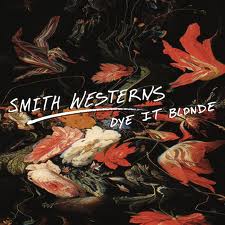Chicago’s Smith Westerns gob up glamorous gum-pop, blowing big bubbles of glistening indie rock power. They’ve been out of school (Northside College Prep) for a couple dozen months, and sound like they want to take over the world with Dye It Blonde, the follow up to last year’s self-titled debut album.
Cullen Omori leads his Teenage Fanclub-loving, glam era-adoring band through big splashy fountains of guitar + bass + drum fun, which demands to be listened to over and over again, mostly for how well played and produced it all is. Every song on here has incessantly gnawing hooks you love being ravaged by throughout the entire song (“Still New,” “End Of The Night”), or slower-then faster cinematic wide-screens with drop-dead dangerous choruses you want to hear on the biggest sound system and the best drugs or drink available (“Smile,” “All Die Young”). The responsibly ornate Bowie-esque keyboards tie it all together, with manicured playing to offset the bounce and blast of mashed-up Beatlesesque tempos. This is easily one of the most listenable and lovable albums of the year.
I only have one problem with all this beauty, and I feel a bit curmudgeonly for mentioning it, but I have no idea what these songs are about. There isn’t a single lyric that pops out to me as significant to memorize. With the slyly melodramatic and strangely giddy “All Die Young” I have a touchstone of end of the night self-destructiveness to reference (and just in terms of emotional resonance, to all music licensers: Put this in your indie film now!) but really, as powerfully melodic as Omori’s vocals are (and he is a wonderful singer), there are no Blake-ian zingers to hold on to, no Brit-pop bon mots to savor. Maybe I just needed a lyric sheet?
This might be a strange way to look at it, but Smith Westerns could be closer to a more impressionistic take on previous sounds, a sort of Cocteau Twins meets the Kinks. Also, I never really knew what Joe Strummer was actually singing about till a couple of years ago anyways, and I bought London Calling when it first came out. So who knows? I’ll be playing this tons over the next year and if there are any deeper meanings that will reveal themselves besides “Smile” and “Dance Away” I’m sure this will cause me to hear them.
